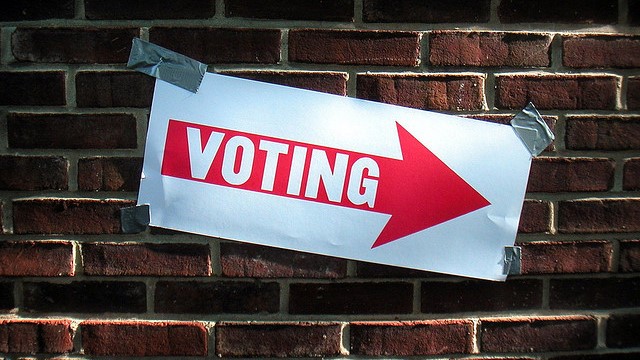
This story is produced by the award-winning journalism nonprofit Capital & Main and co-published here with permission.
Dorian Warren was living less than a 10-minute walk from the U.S. Capitol and with his new baby during the Jan. 6, 2021, insurrection. A day later, as the sirens outside his window blended with his baby’s crying, Warren told Capital & Main that he was still hopeful about the country’s future. Raphael Warnock and Jon Ossoff had defeated their Trump-backed opponents in Georgia, an election that would give Democrats a governing majority—and focus the work of the nonprofits where Warren serves as co-president, Community Change and Community Change Action.
For the past two years, these groups have been engaging mostly Black and brown voters in Arizona, Georgia, Michigan, New Mexico, Nevada and Wisconsin. Community Change and its partner organizations have knocked on almost 11.7 million doors this election cycle. Some of that work has been around policy battles like the successful fight to win student loan forgiveness. This direct engagement gave Warren a view of the electorate he felt was overlooked by news media with their predictions that a red wave was a fait accompli.
Warren, interviewed the day after the midterms by Capital & Main, remains hopeful about the future, if critical of the pundit class. And he’s not finished for the year. Once again, control of the Senate may come down to the U.S. Senate race in Georgia. “We’re going to be on the ground in the state until the runoff,” vows Warren.
This interview has been edited for length and clarity.

Capital & Main: People were expecting a red wave. It doesn’t appear to have materialized. Are you surprised?
Dorian Warren: I have to say I was more optimistic than many of the pundits [were] yesterday. I am angry at the chorus of armchair pundits who created a dominant media narrative around the red wave with little evidence of it. I’m furious about that because for those of us who do the work on the ground to persuade [people] to vote, it was actually a challenging narrative environment when voters and all of us are being told, “This is going to be a red wave or a red tsunami,” as if, for instance, women voters had amnesia from the summer around the overturning of Roe v. Wade and were just focused on the economy and inflation. Not true, it turns out. Or Black voters, yet again, basically the conscience of America, turning out and showing up and really voting our values around racial justice and freedom and resilience.
I was worried, but still really hopeful because we knew in terms of enthusiasm and turnout, especially in early voting, that what we were hearing, especially from national media, was very different from what we were hearing and experiencing on the ground.
What do you think motivated your voters to turn out?
The answer to that honestly varies depending on the place and demographics of voters. Often, pundits and analysts and people like me look at exit polls and say, “Oh, it’s these issues. These issues turned out voters.” And that’s partly true. Abortion, absolutely. No question. The Dobbs decision this summer, we forget, resulted in a huge increase in voter registration, particularly among women. And for sure, it turned out there were a whole lot of people for whom it was the No. 1 salient issue, even more salient than the economy or inflation, for instance.
But not all voters are motivated by issues alone. Sometimes people vote based on identity. I’ve been looking at some data around Black voters, in particular. Yes, a whole bunch of Black voters turned out around the economy or abortion. But a lot turned out because of their identity as Democrats or as voters. My mother is a voter. It’s part of her identity, and therefore she goes to vote. It’s not like she’s motivated by issues first.
As we parse the data, we’re going to learn a lot more. In Michigan, reproductive freedom and, frankly, voting rights were also on the ballot. And I think that motivated a whole lot of Michigan voters, and especially Black Michigan voters, because they knew the stakes were so high around both of those issues: voting rights, which is really an issue of democracy, and reproductive freedom.
Without question, in New Mexico, a whole bunch of folks in that state were child care voters, and were voting on that. A constitutional amendment to enshrine the right to early education and child care with a funding mechanism that makes it accessible and affordable passed overwhelmingly.
How do you evaluate the current threat to our democracy? The Washington Post reported that more than 169 of the 291 election deniers running for office were projected to have won their races across the country.
That’s a really hard question.
Let me couple it with another. Election denialism has been paired with a fomenting of cultural and racial grievance. Campaigning around Critical Race Theory is a great example. What is the connection between the two?
There’s a survey of election deniers, about their worldview on a range of issues. In some ways, the election deniers and the MAGA right are more intersectional sometimes than we are on the left. They’re super clear: ’We don’t like immigrants,” “We don’t like Black people,” “We don’t want women to have freedom,” “We definitely don’t like trans people.” They lump all those things together. They don’t like teaching real history in schools. It actually is a worldview that links those things together. Now, I’m not saying that’s the case with the entire right-leaning electorate. Probably a third for sure.
How does this affect your electoral work?
The rise of white nationalist authoritarianism within the Republican Party has forced a lot of us to expand our electoral work into protecting and deepening democracy. It’s not enough anymore for us to do the year-round organizing to turn people out. We have to push back against voter restrictions and voter suppression and say that’s a spade. We have to push back against the Big Lie that election results don’t count if they don’t go the Republicans’ way. We have to recruit and train volunteers on de-escalation techniques and making sure people aren’t intimidated at the polls.
There are things that we’ve been forced to expand in terms of the scope of our work because of the existential threat to democracy the white nationalist extremist faction within this country is pursuing. Now that’s not new. That’s always been here. It’s not like they just came out of nowhere. We saw that at the end of Reconstruction. We saw that with the pushback against the Civil Rights Movement gains. This has always been a core element of this country. It’s just in 2022, this is our fight now. And then you add multiple media platforms that are built from misinformation and disinformation and manipulation. That’s another challenge for us as well.
Do you think these midterm results represent any kind of check on the rise of the anti-democratic MAGA right? It’s not a resounding defeat given how many election deniers are still in office.
Maybe. I don’t think we know yet. There’s still people to be held accountable for Jan. 6 that have not been held accountable. Maybe this will send a signal to conservatives that if you bet on candidates like Trump did, who are election deniers, that they will lose in many cases. Not all, because there’s plenty that won, as you pointed out. But maybe this sends a signal that at least the incentive structure within the Republican Party might have to shift if they want to win national elections and have national power. But I don’t know.
And we saw Ron DeSantis, an election denier who made a spectacle of bussing migrants to Martha’s Vineyard, do really well in Florida, including in Miami-Dade County.
There are at least two things to say about Florida. One, there needs to be some internal reckoning among progressives in the Democratic Party around Florida and what’s really going on there and why people have given up on the state and not invested in the year-round organizing it would take to create a progressive majority in the state. Two, DeSantis’ victory presents an off-ramp for some of the Republican Party who want another option besides Trump.
We’re going to see infighting in the Republican Party around what’s the path forward for them. Do they keep betting on Trump and Trumpism? Or do they bet on DeSantis? Which is basically Trumpism in a different package, if you ask me.
We last spoke on Jan. 7, 2021, one day after the Capitol riot, and things were really raw. You were living near the Capitol, and I heard sirens in the background coming through the phone. How are you feeling today, reflecting on where we were then and where we are now?
Wow. In a word, hopeful, much more hopeful, honestly. Hopeful because of the things that we know are true. Year-round grassroots organizing matters. Not waiting until the last minute to talk to voters matters. Having friends and family talking to voters, particularly Black and brown and immigrant voters who are least likely to be contacted by traditional campaigns—it matters. All the things we knew in 2020 and early 2021 that even got us to Jan. 5, the Georgia runoff election, which was a political earthquake.
That day, the day before the insurrection, was when we learned that both Jon Ossoff and Raphael Warnock were going to the Senate in a state that had been red for a generation. And that took a decade of investment in grassroots organizing and building infrastructure and registering people to vote. Relative to when we spoke on Jan. 7, I’m feeling very much more hopeful today. There’s still, of course, lots of threats to our democracy that were not put to rest last night, but there’s lots of opportunity and reasons for optimism, as well.


We elected a election denier and someone that thinks of himself and denies kids that have nothing to eat at home.
We should be ashamed of ourselves.